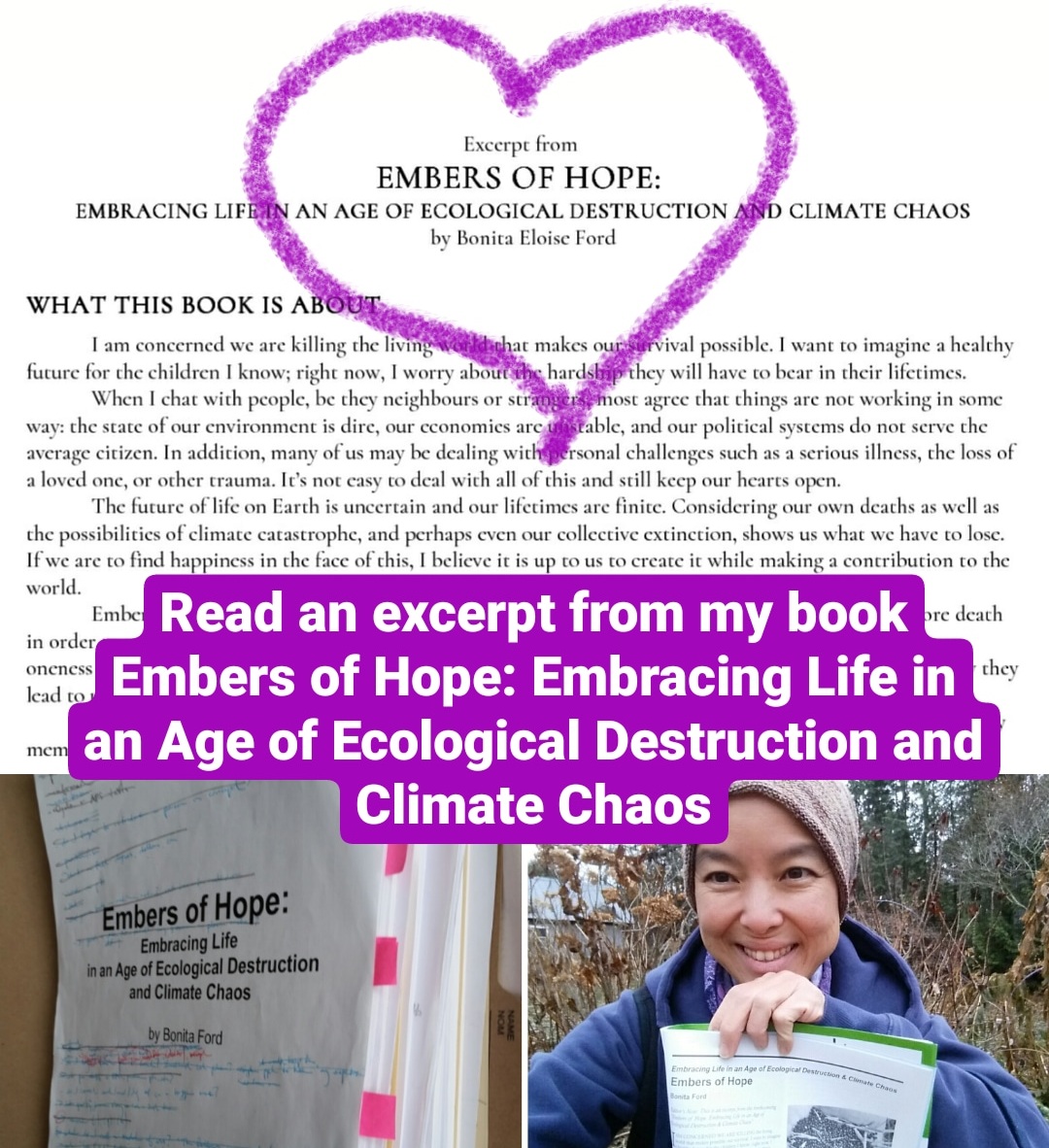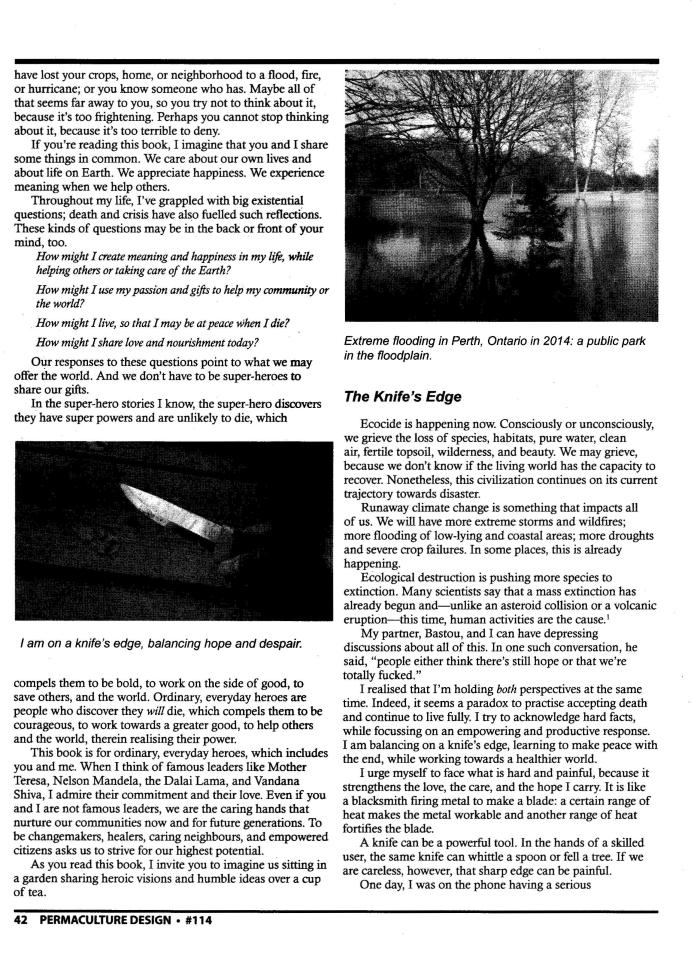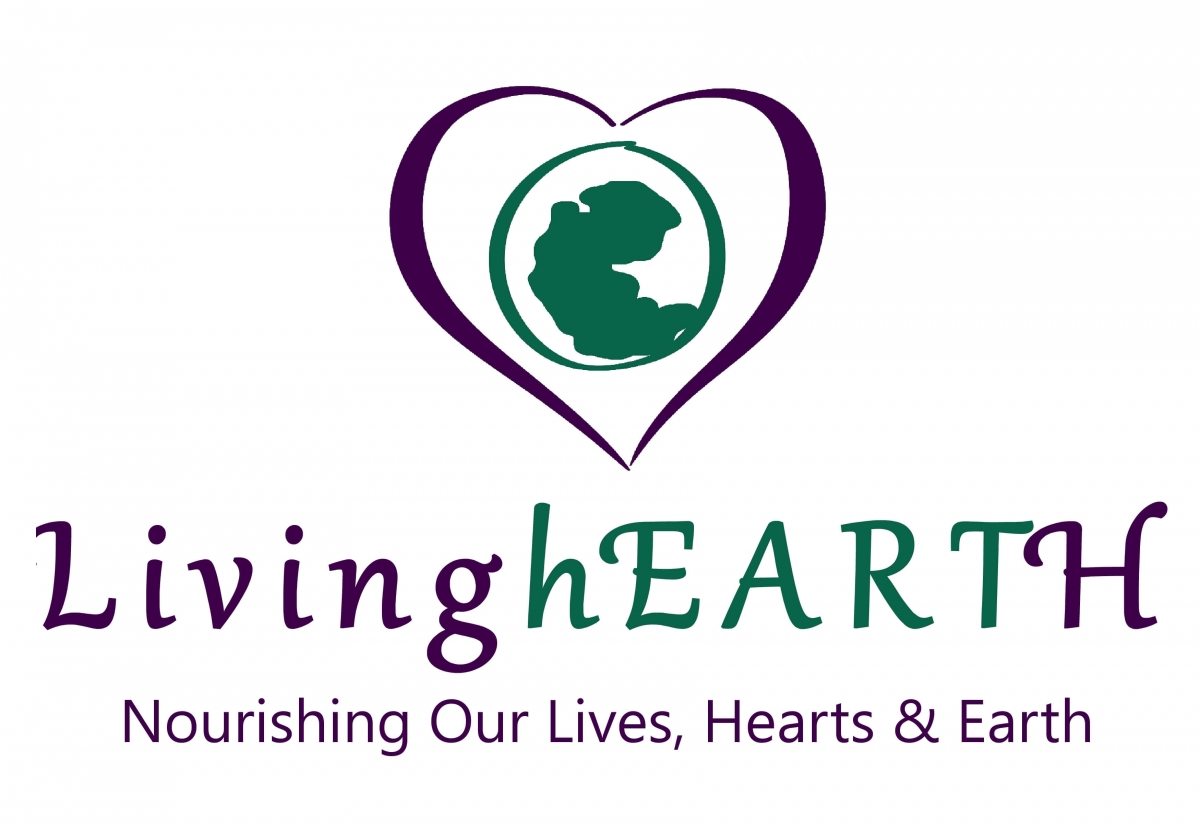
You can read the excerpt below or read a pdf copy here.
Excerpt from
EMBERS OF HOPE: EMBRACING LIFE IN AN AGE OF ECOLOGICAL DESTRUCTION AND CLIMATE CHAOS.
Copyright © 2020 Bonita Eloise Ford.
WHAT THIS BOOK IS ABOUT
I am concerned we are killing the living world that makes our survival possible. I want to imagine a healthy future for the children I know; right now, I worry about the hardship they will have to bear in their lifetimes.
When I chat with people, be they neighbours or strangers, most agree that things are not working in some way: the state of our environment is dire, our economies are unstable, and our political systems do not serve the average citizen. In addition, many of us may be dealing with personal challenges such as a serious illness, the loss of a loved one, or other trauma. It’s not easy to deal with all of this and still keep our hearts open.
The future of life on Earth is uncertain and our lifetimes are finite. Considering our own deaths as well as the possibilities of climate catastrophe, and perhaps even our collective extinction, shows us what we have to lose. If we are to find happiness in the face of this, I believe it is up to us to create it while making a contribution to the world.
Embers of Hope is about doing just that: embracing life in uncertain times. In this book, we explore death in order to reconnect with our vitality, and we confront ecological devastation in an effort to rediscover our oneness with all of life. Although reflecting on these things may feel uncomfortable or scary at first, ultimately they lead to uncovering what is truly important to each of us.
Personally, my perspective has been radically transformed by the deaths of a dear friend and a close family member. I learned through them to be grateful, to do small meaningful things each day, to give back to the community, and to let go, so that when it’s my time to die, hopefully I can be at peace.
My loved ones’ journeys helped me see our global ecological crisis through new eyes. Previously, I thought there were only two options: be hopeful and do everything in my power to change things, or accept that there’s nothing I can do and give up. I now try to hold both perspectives: I am doing what I can to foster a healthier world and make peace with the end; I am nurturing new possibilities and trying to be open to receiving what life brings.
When we take the step of acknowledging our own mortality, how does this affect the way we live? When we look at the threats to our planet home, how does this compel us to act?
We can nurture ourselves and the life around us through our choices. Those choices can be as simple as helping a neighbour, or they can be as significant as protecting a forest or starting a nonprofit to serve food-insecure people in our community. If the end is near, then now is the best time to appreciate life: to feel the air on our faces, to sing, to sit under a tree, to hug a friend.
I hope this book will help you realise or remember how you want to live. May this nourish the seeds of possibility and the embers of hope that you carry.
IS THIS BOOK FOR YOU?
Perhaps you are an environmentalist, an activist, a land or a water protector, a scientist, or a science journalist, and you are feeling helpless, overwhelmed, or burnt out. Or perhaps you are simply concerned about climate change and don’t know what to do about it.
Climate breakdown impacts each of us in different ways. You may have lost your crops, your home, or your neighbourhood to a flood, fire, or hurricane, or you know someone else who has. Or maybe all of that seems far away to you, so you try not to think about it because it’s too frightening. Or perhaps you cannot stop thinking about it because it’s too terrible to deny.
Whatever the case may be, if you’re reading this book, I imagine that you and I share some things in common. We care about our own lives and about life on Earth. We appreciate happiness. We experience meaning when we help others.
Throughout my life, I’ve grappled with big existential questions; death and crisis have also fuelled such reflections. These kinds of questions may be in the back (or front) of your mind, too.
- How might I create meaning and happiness in my life through helping others or taking care of the Earth?
- How might I apply my passion and purpose to helping my community or the greater world?
- How might I live so that I may be at peace when I die?
- How might I share love and nourishment today?
Our responses to these questions point us to what we can offer the world. We don’t have to be superheroes to assist others.
In the superhero stories I know, the hero discovers that they have super powers and are unlikely to die. This compels them to be bold, to work on the side of good, and to save others and the world.
In my experience, ordinary, everyday heroes tend to be the opposite: people who recognise that they will die, and this is what compels them to be courageous, to work towards a greater good, and to help others and the world, therein realising their power.
This book is for those ordinary, everyday heroes, which include you and me. When I think of famous leaders like Mother Teresa, Nelson Mandela, the Dalai Lama, and Vandana Shiva, I admire their commitment and their love. Even if you and I are not famous leaders, we are the caring hands that nurture our communities both now and for future generations. To be changemakers, healers, kind neighbours, and empowered citizens asks us to strive for our highest potential.
As you read this book, I invite you to imagine us sitting together in a garden, sharing heroic visions and humble ideas over a pot of tea.
DESPAIR AND HOPE
Ecocide is happening now. Consciously or unconsciously, we grieve the loss of species, habitats, pure water, clean air, fertile topsoil, wilderness, and beauty, and we don’t know if the living world has the capacity to recover. Nonetheless, our civilisation continues on its current trajectory towards disaster.
Runaway climate change is something that impacts all of us. Hurricanes, tornadoes, wildfires, floods, and droughts are intensifying and becoming more common. Rising sea levels are threatening coastal areas, and fisheries are collapsing. All of these pressures are causing more people to migrate for better chances of survival.
Ecological destruction is pushing an increasing number of species to extinction. Many scientists say a mass extinction has already begun and—unlike an asteroid collision or a volcanic eruption—this time human activities are the cause.1
My partner, Bastou, and I can have depressing discussions about all of this. In one such conversation, he said, “People either think there’s still hope or that we’re totally fucked.”
I realised that I am trying to hold both perspectives at the same time, despite it seeming like a paradox. I practice accepting death while continuing to live fully. I acknowledge hard facts while seeking a productive response. I balance on a knife’s edge, learning to make peace with the end while working towards a healthier world.
I urge myself to face what is hard and painful because it strengthens the love, the care, and the hope I bring. It is like a blacksmith firing metal to make a blade: a certain range of heat makes the metal workable and another range of heat fortifies the blade.
A knife can be a powerful tool. In the hands of a skilled user, the same knife can whittle a spoon or fell a tree. If we are careless, however, that sharp edge can be painful. Most of us know what it’s like to be preoccupied while using a knife and to cut ourselves by accident. Self-awareness is useful, whether we are handling dangerous tools or confronting our mortality.
It seems that life and death are separated only by a fine line, and I’m conscious of how much there is to lose.
At times, I can feel very discouraged about where we are headed as a civilisation. Yet I know many people—caring teachers, parents, activists, researchers, authors, and artists—who endeavour to leave the world a better place. Despair and hope are real for me, and I consciously allow myself both. The despair keeps me focussed on what is at stake and the hope fuels me.
But is hope just a naive, idealistic notion to avoid painful realities? I don’t believe so. To me, hope is a spark of aliveness that wants to grow, fed by a desire to nourish what is beautiful. It does not ensure any particular outcome, though it does invite us to embrace life fully. Hope is about trusting that something meaningful can emerge from losing something that is precious.
The ember of hope I hold is NOT about our civilisation continuing on its current path, believing that the planet is ours for the taking, that humans are more important than other living organisms, or that “survival of the fittest” means we don’t need other people and therefore do not have to care about them.
I do hope that we will do enough in the coming decade to prevent catastrophe later. Still I worry that perhaps we will not make drastic changes until it hits us hard.
I don’t equate hope with getting what I want. I learned this lesson from my dear friend Katherine, who died in 2013. She taught me to consider the worst and then seek to make the best possible. In the three years leading up to her death, Katherine did everything she could to heal and actually exceeded her doctor’s expectations. When it became undeniable that the end of her life was near, however, she let go.
Although we cannot know the ultimate results of all our efforts, it does not diminish the positive impacts we can have. If we are indeed approaching the end, we can be kind to one another and take care of Mother Earth. If there’s a chance that our actions could help alter the destructive course of this civilisation, that would be a welcome surprise.
Ecological crisis can be frightening and may also bring out the best in us. We are aware of what is dying and what could be born. We nurture the seeds that we sow, knowing that tomorrow is a gift of possibility rather than a promise.
BOOK OVERVIEW
Death, ecological collapse, and extinction can be overwhelming—and climate chaos may hasten all of them. Thus, we start in the book with building inner capacities—such as noticing self-defeating thoughts, having gratitude, and cultivating presence—to prepare us for the challenge.
Next, we consider death and ecological crisis to clarify how we want to live. Through two significant deaths and the climate emergency coming to the forefront, I've learned to practise having gratitude and to focus on the small ways I can help others and the world.
My partner and I redesigned our relationships with food, home, money, and livelihood to take better care of ourselves and Mother Earth. Building community became part of being resilient and nurturing our garden has created a small haven for life. With the threat of climate breakdown, all of our actions matter. The world needs all of our efforts and gifts.
In the last part of the book, the reader is led through exercises—meditations, writing, and other activities—to integrate these ideas with their own life.
NOTE
1. Greshko, Michael, “What are mass extinctions, and what causes them?” National Geographic, September 26, 2019, https://www.nationalgeographic.com/science/prehistoric-world/mass-extinc....
This excerpt was published in the Permaculture Design magazine in the November/Winter 2019 issue.



Topics:
- Aboriginal, Indigenous, Native, First Nations
- Earth care, ecological resilience
- Earth-nature-wilderness skills
- edible forest gardens, food forests, perennial edibles
- gardening, local food
- healing, health, wellness
- inspiration, transformation
- Nonviolent Communication
- people care, social resilience
- permaculture
- social permaculture, life design, organisational-business design, community
- spiritual, consciousness shift


Add new comment